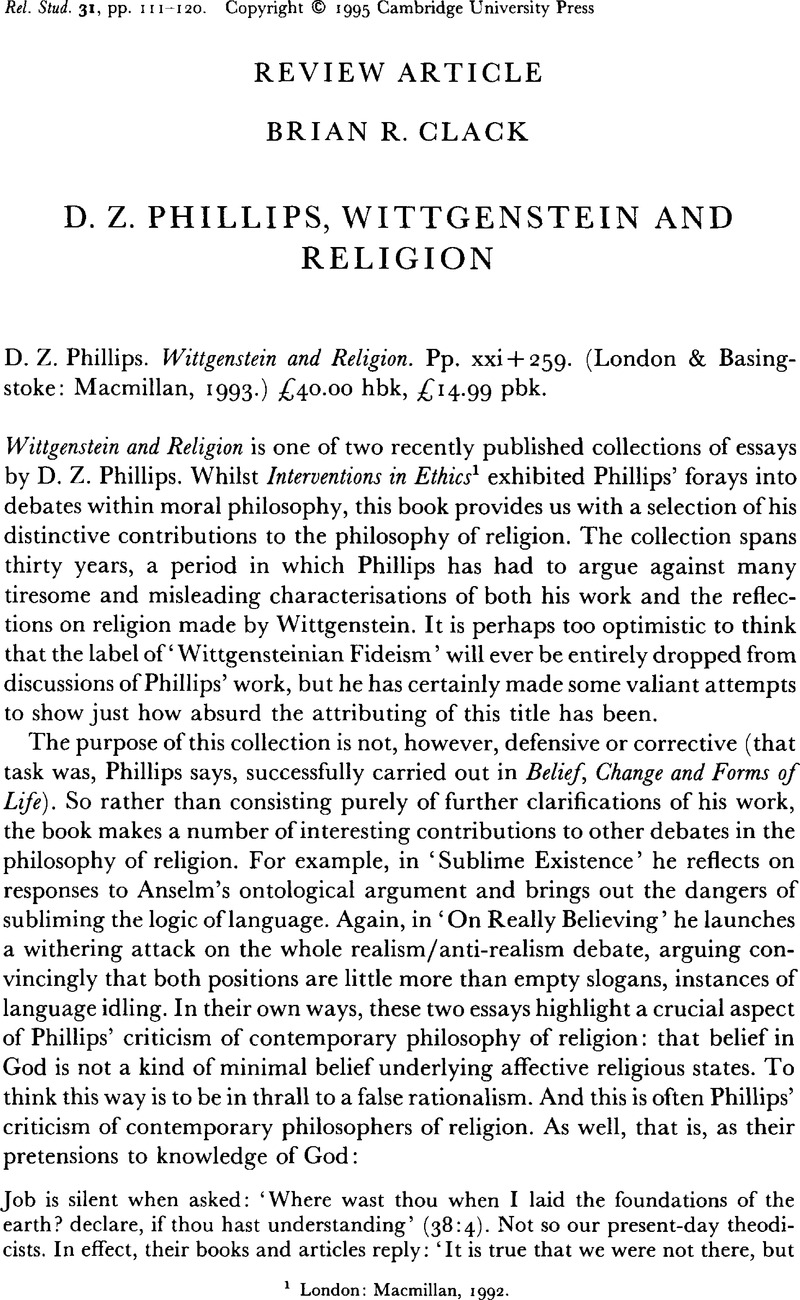Published online by Cambridge University Press: 24 October 2008

1 London: Macmillan, 1992.
2 This assertion reminds one of Evan-Pritchard's description of ‘mystical notions’ as ‘patterns of thought that attribute to phenomena supra-sensible qualities which… they do not possess’. Witchcraft, Oracles and Magic among the Azande (Oxford: Oxford University Press, 1976), p. 229.Google Scholar
3 Jahoda, Gustav, The Psychology of Superstition (Harmondsworth: Penguin, 1970), p. 2.Google Scholar
4 Cf. Frazer, J. G., The Magic Art and the Evolution of Kings, volume two (London: Macmillan, 1911), p. 5.Google Scholar
5 See ‘Wittgenstein on Language and Ritual’, in B. McGuinness (ed.), Wittgenstein and his Times (Oxford: Basil Blackwell, 1982), pp. 81–82.Google Scholar
6 Conrad, Joseph, The Rover (Oxford: Oxford University Press, 1992), p. 225.Google Scholar
7 Ibid. p. 232.
8 Hence his desire to consider ‘metaphysics as a kind of magic’.
9 ‘Philosophy (Sections 86–93 of the so-called “Big Typescript”)’, in Philosophical Occasions 1912–1951 (Indianapolis: Hackett, 1993), p. 199.Google Scholar
10 Remarks on Frazer's Golden Bough (Doncaster: Brynmill Press, 1979), p. 10.Google Scholar
11 The Principles of Linguistic Philosophy (London: Macmillan, 1965), p. 81.Google Scholar
12 The Scapegoat (London: Macmillan, 1913)Google Scholar, p. v.
13 ‘Philosophy’, p. 197.
14 To be fair to Phillips, he also sees difficulties in the shouldering of sin by the innocent Christ. See his ‘Scripture, Sin and Speech’ (Archivio di Filosofia, vol. 60, 1992, pp. 281–290).Google Scholar
15 The Blue and Brown Books (Oxford: Basil Blackwell, 1969), p. 172.Google Scholar
16 Ibid. p. 173.
17 Cf. Philosophical Investigations (Oxford: Basil Blackwell, 1958), §40.Google Scholar
18 See, for example: Hallpike, C. R., The Foundations of Primitive Thought (Oxford: Clarendon Press, 1979), pp. 384–423Google Scholar; Skorupski, J. M., Symbol and Theory (Cambridge: Cambridge University Press, 1976), pp. 144–148.Google Scholar
19 Remarks on Frazer's Golden Bough, p. 5.
20 Pascal, Fania, ‘Wittgenstein: A Personal Memoir’, in Rhees, R. (ed.), Recollections of Wittgenstein (Oxford: Oxford University Press, 1984), p. 20.Google Scholar
21 Ludwig Wittgenstein and the Vienna Circle (Oxford: Basil Blackwell, 1979), p. 68.Google Scholar
22 Unsatisfactory because those who appeal for rain often do seem to expect results: sometimes, if rain does not fall the rain-maker is killed. See Frazer, J. G., The Golden Bough (London: Macmillan, 1922), p. 107.Google Scholar
23 ‘When a man laughs too much in our company (or at least in mine), I half-involuntarily compress my lips, as if I believed I could thereby keep his closed’, ‘Remarks on Frazer's Golden Bough’, in Luckhardt, C. G. (ed.), Wittgenstein: Sources and Perspectives (Hassocks: The Harvester Press, 1979), p. 73.Google Scholar
24 Review of Religion Without Explanation, Mind vol. 88, 1979, p. 155.Google Scholar